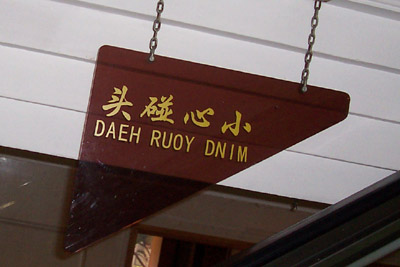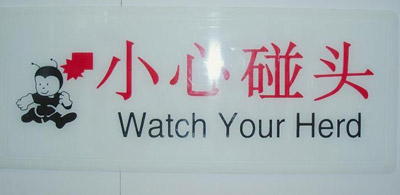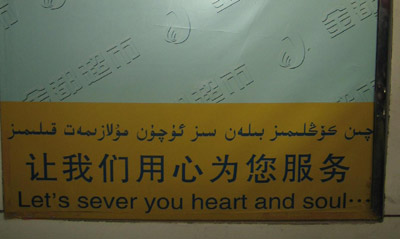
(When in China, do as the Chinese do – read from right to left!)
In a bid to build up the city's international image, as well as to create a sound and smooth language environment for the 29th Summer Olympic Games in 2008, Beijing launched a campaign to improve its bilingual signs four years ago. The municipal government set up committees, task forces and all sorts of projects to undertake major construction work: the removal of all signs written in Chinglish.Chinglish, obviously a portmanteau of 'Chinese' and 'English', may refer to the pidign English which is profound influenced by Chinese grammar and accent, or the broken Chinese woven with English words used by some American-born Chinese who, due to their limited Chinese vocabulary, use English words all the time when speaking Chinese. However, in Beijing Chinglish refers to awkward translation arising from incorrect grammar, non-idiomatic phrases, erroneous vocabulary usage and coined words.
Take a look at some examples:
- To take notice of safe: The slippery are very crafty
- Extraordinary Door
- Deformed Man Toilet
- Engine room is a serious place
- Please don't stand, sit and pass through the surface of water feature
- The luxuring nothing rail remote controlling stretches out and draws back the door
- Be careful, slippery slopes
- Emergency Exit
- Disabled Toilet
- Caution – Engine room
- Please don't stand, sit or walk by the side of the pond
- Deluxe wireless remote controlled retractable door

(What sort of herd shall we watch? Do cattle or sheep usually graze in department stores in Beijing?)

(What a horrible supermarket where customers end up being slaughtered physically and spiritually)
I hope all signs written in such a rib-tickling, and sometimes almost incomprehensible, Chinglish language can be supplanted by proper signs in the run-up to the Olympic Games so that foreign visitors and Olympians will not get scared or lost in translation.





No comments:
Post a Comment